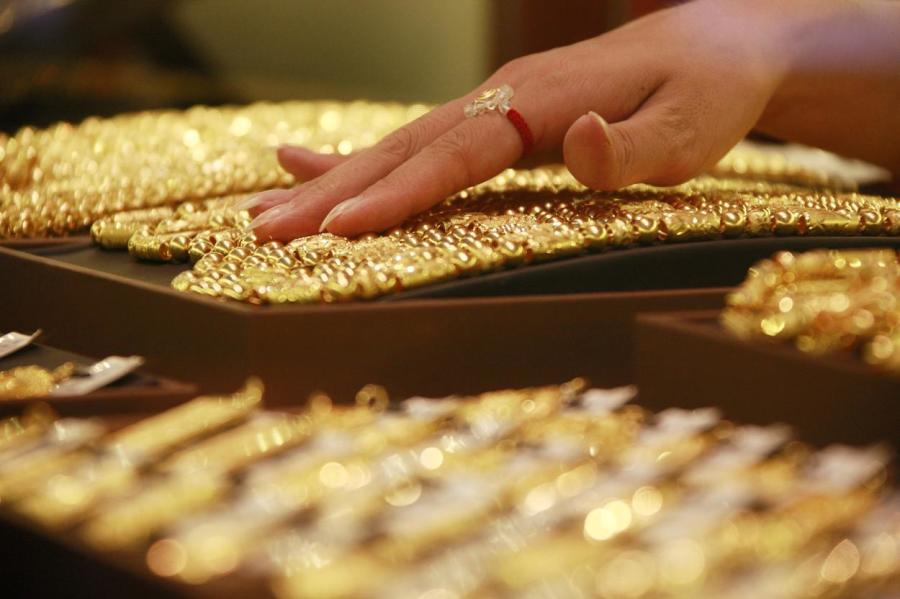File Photo: An employee at a gold store in Huaibei, Anhui Province, China, displays some gold ornaments. (Photo by VCG/Getty Images)
People News - Following the December 20 investigation of Gao Guangrong, chairman of Eoptolink Technology Inc., for alleged violations such as illegally transferring restricted stocks, another major corporate leader has fallen. On December 23, the Discipline Inspection and Supervision Group of the Central Commission for Discipline Inspection (CCDI) stationed at the State-owned Assets Supervision and Administration Commission (SASAC) announced that Chen Xiongwei, former Party Secretary and Chairman of China Gold Group Gold Jewelry Co., Ltd., was under investigation for serious violations of discipline and law. Reports indicate that a large cache of gold and jewelry was discovered at Chen’s home, with the quantity described as astonishing.
China Gold Group Gold Jewelry Co., Ltd. is a leading producer and retailer of gold and jewelry under the “China Gold” brand. It was listed on the Shanghai Stock Exchange in February 2021. Its parent company, China National Gold Group Corporation, is the only state-owned enterprise in China’s gold industry.
Born in 1961, Chen Xiongwei has worked in the gold industry for decades. He served as Chairman and General Manager of “China Gold” from 2012 to 2018 and was Party Secretary and Chairman of the group from 2018 to June 2023. Chen’s two superiors had already been taken down prior to his investigation. Lu Jin, former Chairman of China National Gold Group Corporation, was investigated in late September, and Zhao Zhanguo, former Deputy General Manager of the same company, was announced under investigation on December 8.
China National Gold Group Corporation controls four listed companies: Zhongjin Gold, China Gold International, China Gold, and Zhongjin Irradiation. Among them, China Gold is part of the second batch of mixed-ownership reform pilot enterprises initiated by the National Development and Reform Commission and the first to be listed on the main board under the “Double Hundred Action” for SOE reform.
In the third quarter of this year, China Gold reported revenue of 11.419 billion yuan (RMB), with a net profit of 117 million yuan after deducting non-recurring items. On December 23, its stock closed at 8.70 yuan per share, with a total market capitalization of 14.62 billion yuan.
As the year draws to a close, the CCP has intensified its anti-corruption efforts and the handling of major corrupt officials. On the same day Chen Xiongwei’s investigation was announced, the Intermediate People’s Court of Qiandongnan Miao and Dong Autonomous Prefecture in Guizhou Province publicly sentenced Liu Wenxin, former Deputy Secretary of the Guizhou Provincial Political and Legal Affairs Commission, in a first-instance trial. Liu was convicted of bribery, offering bribes, money laundering, and carrying controlled knives, with his illicit gains amounting to 609 million yuan. He was sentenced to death with a two-year reprieve.
Also on the same day, Chongqing’s Fifth Intermediate People’s Court sentenced Jiao Xiaoping, former member of the Party Committee and Deputy Commander of the Xinjiang Production and Construction Corps, to 14 years in prison for accepting bribes totaling over 67.43 million yuan and fined him 5 million yuan.
Between December 20 and 21, the 10th Committee of the CCP Tibet Autonomous Region held its seventh plenary session and endorsed the expulsion of Lhasa Mayor Guo Guo from the CCP for severe violations of discipline and law.
From December 10 to 21 alone, incomplete statistics show that at least 13 senior officials above the provincial level have been dealt with by the CCP. These include Ke Wei, General Manager of China Datang Corporation; Ji Binchang, former Vice Governor of Shandong Province; Gou Zhongwen, former member of the National Committee of the Chinese People’s Political Consultative Conference (CPPCC) and former Deputy Director of the Ethnic and Religious Affairs Committee; Han Yong, former Chairman of the Shaanxi Provincial CPPCC; Xiong Xue, former Deputy Mayor of Chongqing; Wu Cunrong, former Secretary-General and Chairman of the Shanxi Provincial CPPCC; and others. Notably, on the morning of December 17, Li Jianping, former Party Secretary of the Hohhot Economic and Technological Development Zone in Inner Mongolia, was sentenced to death for multiple crimes, including embezzlement of 3 billion yuan.
Why Has the CCP Intensified Its Anti-Corruption Campaign at Year-End? Observers suggest that one key reason for the CCP’s anti-corruption drive may be to raise funds. As the year ends, local CCP governments, administrative institutions, and key enterprises await wages, bonuses, and other payments. In some cases, long-term wage arrears have even sparked protests. However, with the CCP’s numerous financial obligations, resources are stretched thin. Reports suggest that some local governments have resorted to borrowing from temples, while others prioritize extravagant expenditures, such as transporting 200 kilograms of gold to Africa or South America, over providing basic allowances for migrant workers. Seizing wealth from corrupt officials and wealthy business figures is seen as a quick way to fill the financial gap while also creating the appearance of moral integrity and loyalty within the Party.
By mid-December, the confiscated illicit assets of recently prosecuted individuals include: Liu Wenxin: 609 million yuan; Ji Binchang: 526 million yuan; Han Yong: 261 million yuan; Xiong Xue: 148 million yuan; Jiao Xiaoping: over 72 million yuan; Tang Shuangning, former Chairman of China Everbright Group: fined 1.3 million yuan; Li Jianping: 3 billion yuan. The combined total reaches approximately 4.6 billion yuan, excluding undisclosed confiscations or amounts not publicly revealed.










News magazine bootstrap themes!
I like this themes, fast loading and look profesional
Thank you Carlos!
You're welcome!
Please support me with give positive rating!
Yes Sure!